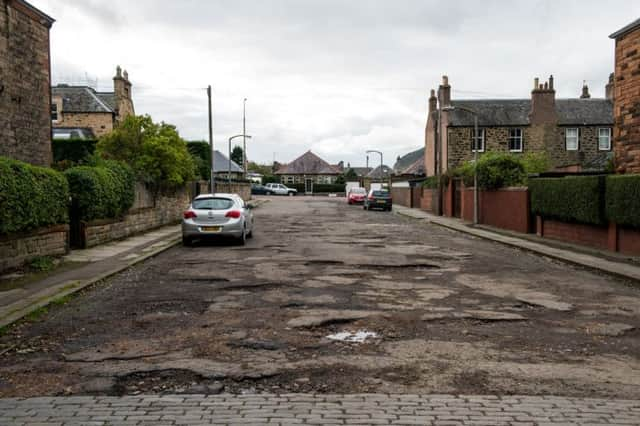Scotland counts the £2.7m cost of pothole damage


The figures mean local councils have shelled out about £1,600 a day for the likes of burst tyres and suspension damage.
Local government umbrella group Convention of Scottish Local Authorities (Cosla) blamed a growing “compensation culture” which encourages motorists to make claims, while the Automobile Association (AA) insisted it was “nonsensical” to be making the payouts when roads would have to be repaired in any event.
Advertisement
Hide AdAdvertisement
Hide AdMotorists were reimbursed to the tune of £584,745 in 2012-13, with the five-year total standing at more than £2.7m, according to figures released under Freedom of Information to the Conservatives.
Last year, Glasgow paid out nearly £360,000 in compensation, by far the highest in Scotland.
Elsewhere, Aberdeenshire was forced to settle £34,000 worth of claims, and the figure in Edinburgh was more than £27,000.
Scottish Conservative transport spokesman Alex Johnstone said: “The state of roads both in the city and the countryside are a matter of real concern for motorists.
“We need to make sure surfaces are kept in good condition, because investment in that would very much reduce the cash paid out in future.”
The true damage caused by potholes is believed to be even higher, but many drivers do not try to recoup the money paid for repairs.
Mr Johnstone added: “Perhaps if the Scottish Government took more of a lead in properly investing in our road network and supporting motorists, it would encourage more councils to do the same.”
Councillor Stephen Hagan, Cosla development, economy and sustainability spokesman, insisted the condition of roads in Scotland is improving despite recent harsh winters and budgets falling by 20 per cent – which he said was a “tremendous achievement” by the councils.
Advertisement
Hide AdAdvertisement
Hide AdHe added: “The bottom line is that in the modern world we now occupy, there is far more of a compensation culture and people are often actively encouraged to pursue claims, but councils only pay compensation when instructed to do so by their lawyers.”
Despite some recent harsh winters, the latest Scots independent roads conditions survey indicated the condition of Scotland’s roads is improving. Cllr Hagan added: “There is no doubt councils have been actively addressing the general condition of roads across Scotland despite reduced budgets over the last few years through the implementation of road asset management plans.”
A spokesman for the AA said a “sticking plaster” approach to repairs was at the heart of the problem.
He added: “The fact is that councils are going to have to repair the roads anyway and paying compensation on top of this seems nonsensical to most people.
“The problem is that so many repairs are just putting a sticking plaster over the holes and they open up the following year when the wet and cold and freezing temperatures return.
“If you’re going to do the road properly, you have to resurface and repair the fabric. It’s down to good investment in roads.”